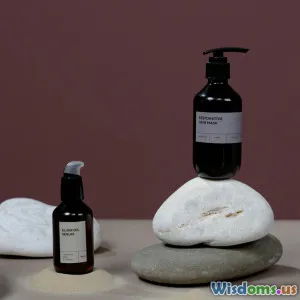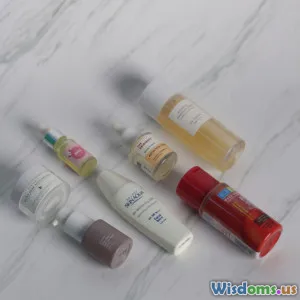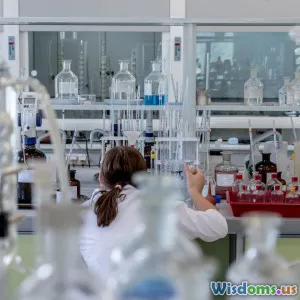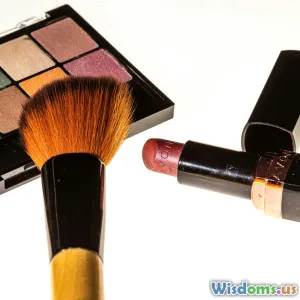
Does Drinking Water Really Clear up Your Skin?
9 min read Exploring how drinking water impacts skin health and the truth behind hydration myths. (0 Reviews)
Does Drinking Water Really Clear up Your Skin?
Introduction
Water: the elixir of life, often praised not only for sustaining bodily functions but also for promoting vibrant, healthy skin. We've all heard the age-old advice: "Drink more water for clearer skin." But does increasing your water intake truly lead to a noticeable improvement in your complexion? This question generates curiosity and skepticism alike.
Skin can appear dull, dehydrated, acne-prone, or flushed, leading many to seek simple, effective remedies. The idea that drinking more water can 'flush out toxins' and enhance skin clarity is enticing—but is it an oversimplification or backed by solid science?
This article dives deep into the interplay between hydration and skin health. We’ll explore what dermatologists say, what scientific studies reveal, and practical considerations you can implement today to help your skin glow from within.
Understanding Skin Structure and Function
To appreciate how water influences the skin, it's vital to understand the skin’s anatomy. The skin consists of three primary layers:
- Epidermis: The outermost barrier, protecting the body from environmental damage.
- Dermis: Contains collagen, elastin fibers, and blood vessels, providing structure and elasticity.
- Hypodermis: The fat layer that insulates and cushions the body.
Throughout these layers, skin cells rely on adequate hydration to maintain elasticity, facilitate cell turnover, and support overall barrier function.
How Hydration Works in the Body and Skin
Water intake affects hydration at the systemic level, impacting circulatory function, cellular metabolism, and waste elimination via kidneys and sweat. Yet, the skin is a complex organ where direct hydration doesn't always equate to immediate visual clarity.
-
Hydration vs Moisturization: Drinking water hydrates from within, supporting the skin cells’ physiological processes. However, maintaining skin surface moisture is primarily achieved through topical moisturizers that prevent transepidermal water loss.
-
Fluid Distribution: After ingestion, water moves through vascular and interstitial compartments before reaching skin tissue. Factors like environmental humidity, diet, and genetics influence how skin appearance changes.
Scientific Evidence: Does Drinking More Water Improve Skin?
Studies on Skin Hydration
A 2015 study published in Skin Pharmacology and Physiology observed healthy females increasing water consumption from about 1.6L to 2.6L per day for 40 days. Results showed significant improvement in skin hydration, elasticity, and roughness, especially in participants who were normally low-water drinkers.
Dr. Lorraine Hill, lead researcher, noted that increasing water intake positively affected the skin’s biomechanical properties, indicating healthier skin. This suggests that people who begin with insufficient hydration may experience visible skin benefits by drinking more water.
Skin Conditions and Water Intake
When it comes to issues like acne, eczema, or dermatitis, evidence linking water consumption to symptom relief is limited and mixed.
-
Acne: A few Dermatology experts suggest good hydration supports the skin’s barrier and mitigates inflammation. However, acne's causes—including hormones, bacteria, and genetic predisposition—often overshadow any direct impact from water intake.
-
Eczema: Maintaining skin hydration externally via emollients is critical, but systemic hydration can assist overall skin function.
Expert Opinions
Dr. Doris Day, a prominent New York dermatologist, mentions, “Drinking enough water is important for overall health, but it is not a magic bullet for clear skin.” She emphasizes a holistic approach—good skincare routine, healthy diet, sun protection, and managing stress alongside hydration.
Myths vs Facts
Myth: Water 'Flushes Out' Skin Toxins
Skin diseases or dullness are rarely caused by ‘toxins’ that need to be flushed out by drinking water. The liver and kidneys handle detoxification. Skin health involves multiple factors beyond hydration.
Fact: Dehydrated Skin Looks Dull
Chronic dehydration can cause skin to become dry and flaky, resulting in a lackluster appearance. Adequate hydration supports skin barrier function and elasticity.
Other Factors Affecting Skin Health and How Water Plays a Role
Nutrition
Balanced diet rich in antioxidants, healthy fats, vitamins (like A, C, E), and minerals play a vital role alongside hydration.
Sleep and Stress
Both influence endocrine health and skin regeneration. Water aids metabolism but can’t reverse damage from chronic stress.
Environmental Exposure
Sun, pollution, and harsh climates impact skin condition. Water intake supports skin but protects less against environmental stressors.
Age
As skin ages, natural hydration reduces. Supplementing with topical moisturizers is essential, but drinking water remains important.
How Much Water Should You Drink for Healthy Skin?
The commonly recommended 8 glasses (~2 liters) a day is a general guideline. Individual needs vary with activity level, climate, body size, and health conditions.
Some tips:
- Listen to your body’s thirst cues.
- Increase intake during exercise or hot weather.
- Consider water-rich foods like cucumbers, watermelon, and oranges.
Practical Steps to Enhance Skin Through Hydration
-
Combine Internal and External Hydration: Hydrate by drinking water and use moisturizers suited for your skin type.
-
Limit Dehydrating Substances: Reduce excessive caffeine and alcohol that promote water loss.
-
Maintain a Balanced Diet: Include omega-3 fatty acids and antioxidants that complement hydration effects.
-
Protect Your Skin: Use gentle cleansers and sunscreen to minimize external damage.
Conclusion
Drinking water is undeniably essential for overall health and supports basic skin function. Scientific evidence reveals that increasing water intake can improve skin hydration, appearance, and quality—especially in those who are initially dehydrated. However, the notion that simply drinking more water will clear up skin conditions like acne or permanently transform complexion remains overstated.
True skin health depends on an integrated approach: hydration plays a critical but complementary role alongside diet, skincare, lifestyle habits, and environmental protection. You cannot rely on water alone, but it is an accessible, affordable self-care habit that contributes importantly to a radiant, resilient complexion.
So next time you reach for that glass of water, remember: it’s doing much more than quenching your thirst—it’s one foundational building block for your skin’s enduring glow.
References
- Hill, L., et al. (2015). "Increased water intake improves skin hydration and biomechanics." Skin Pharmacology and Physiology.
- Day, D. Dermatology Expert Opinions.
- Mayo Clinic. "Skin care: How to help dry skin."
- National Academies of Sciences, Engineering, and Medicine (2004). "Dietary Reference Intakes for Water."
Note: This article is educational and not a substitute for medical advice. Consult a dermatologist for personal skin concerns.
Rate the Post
User Reviews
Popular Posts

















